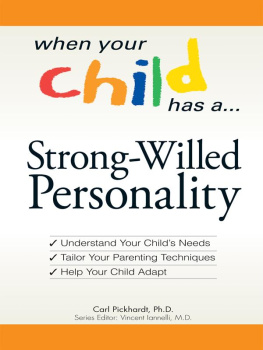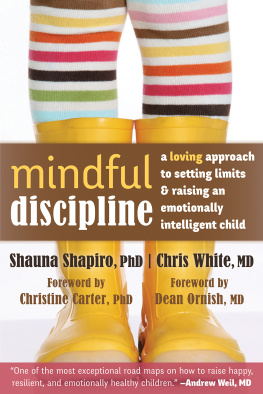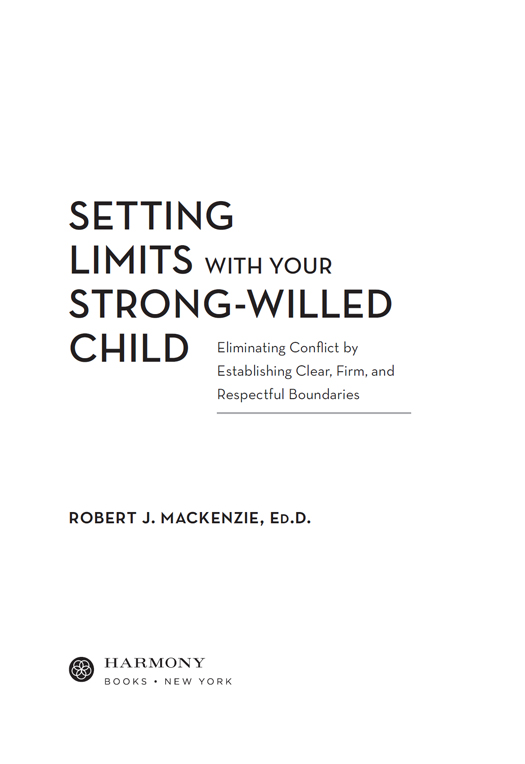ALSO BY THE AUTHOR

Setting Limits
Setting Limits in the Classroom
Copyright 2001, 2013 by Robert J. MacKenzie
All rights reserved.
Published in the United States by Harmony Books,
an imprint of the Crown Publishing Group,
a division of Random House LLC, a Penguin
Random House Company, New York.
www.crownpublishing.com
Harmony Books is a registered trademark, and the Circle colophon is a trademark of Random House LLC.
Originally published in paperback in the United States by Prima Publishing, Roseville, California, and subsequently by Three Rivers Press, an imprint of the Crown Publishing Group, a division of Random House, Inc., New York, in 2001.
In order to protect their privacy, the names of some individuals cited in this book have been changed. Any similarities to real names of persons is purely coincidental.
Library of Congress Cataloging- in- Publication data is available upon request.
ISBN 978-0-7704-3659-9
eISBN 978-0-7704-3660-5
Illustrations by Tom McLelland
Cover design by Lauren Monchik
Cover photographs: Rubberball/Mike Kemp, Nathan Blaney, George Doyle, Neustockimages
v3.1_r2
This book is dedicated to my two wonderful sons, Scott and Ian, who have helped me understand and appreciate the uniqueness of our individual temperaments and the importance of clear, firm, respectful limit setting.
CONTENTS
ACKNOWLEDGMENTS
Special thanks goes to those who supported my workshops in major ways and to those who contributed to the writing of this book.
To Bob Trigg and Dave Gordon, past superintendents of the Elk Grove Unified School District, for funding and supporting my teacher and parent workshops for more than fifteen years.
To Ben Dominitz, publisher; Jamie Miller, acquisitions editor; Marjorie Lery, project editor; and all the other good folks at Prima Publishing for believing in my projects.
To Duane Newcomb, literary consultant, for teaching me nearly everything I know about writing books of this sort.
To Sandra Isla, graphics consultant, for assistance with the many charts and diagrams.
To Lisa Stanzione, my best friend and sounding board for testing out my ideas.
To all the parents and children Ive seen over the years in my workshops and counseling work. Your experiences helped many of the ideas and methods in this book take shape.
INTRODUCTION
If you want to discover what doesnt work for you in this life, do one or all of the following three things: get married, start your own business, or raise a strong-willed child. Ive done all three, but raising a strong-willed child has taught me more about myself, about others, and about the importance of setting clear, firm limits than any other experience.
Im a proud parent of two wonderful sons. My oldest son has a temperament much like my own. Hes cooperative, sensitive, and eager to please. He does what hes asked most of the time, and Ive learned to depend on his cooperation. Parenting is easy! I said to myself for the first three years. Then, my second son was born, and everything changed. Nothing in my lifetime had prepared me for this experience.
He dawdled at mealtimes and getting dressed, resisted picking up his toys and messes, and always seemed to be the last one out the door. His schedule never seemed to match up with other family members. He had many strong traits, but the one that stuck out most prominently was his stubborn determination.
He understood what I wanted when I asked him to cooperate. He just didnt want to do it much of the time. The simple, polite requests that worked so well with his brother didnt work with him. He was very determined to have things work out on his terms. I did my best to get him to cooperate. I repeated, reminded, warned, cajoled, gave second chances, pleaded, bribed, and bargained for his cooperation. It was exhausting, and it didnt work!
After a while, Id lose my patience and become angry. Id raise my voice and threaten to take away all his favorite toys and privileges for long periods of time. Sometimes, this worked. Other times, it didnt. But even when it worked, I felt awful, because I had promised myself I would never treat my children this way. Then Id soften and revert back to the old repeating, reminding, and persuading routine that didnt work the first time. It was crazy!
I thought I was supposed to know what to do. I had a masters degree in psychology, a solid background in child development, and I was working on a doctoral degree in counseling psychology at the time. Somehow, none of this made any difference when it came to getting my youngest son to cooperate. I was doing the best I could with the guidance tools I had, but my tools werent working, and I didnt know what else to do. I was beginning to wonder if there was something wrong with me or with him.
Fortunately, I was able to acquire the tools I needed from the real pros. In 1979, I participated in a research study on teacher effectiveness at the University of California, Davis. My job was to observe effective teachers in their classrooms and record the specific things they said and did that contributed to cooperation and achievement.
I didnt realize it at the time, but the teachers I observed were masters at setting limits. They didnt give in to students who were uncooperative or disrespectful, and they didnt try to overpower them with threats, shaming, or long, drawn-out consequences. Instead, these teachers held their ground, maintained a respectful tone, gave clear messages with their words, and supported their words with effective action. They got a high level of cooperation and respect, and they made it look easy.
Best of all, their guidance methods worked with all students, not with just the compliant ones, but also strong-willed students and those in between. These teachers were prepared to teach their rules the easy way or the hard way. It didnt matter, because they had the tools to get the job done.
The importance of this discovery didnt hit home until I started using these tools with my own sons. Even my youngest son cooperated! He tested and resisted less and started making better choices to cooperate just like his brother. The daily power struggles began to disappear. For the first time in years, I began to feel like an effective parent again. All I had lacked were the right tools to get the job done.
I believed if I could get these results, others could too. In 1985, I piloted a workshop for teachers. The response was overwhelmingly positive. The methods were clear, easy to learn, and best of all, they worked with all students, not just the compliant ones. The workshop became a book, Setting Limits in the Classroom, which has been tested and used successfully by thousands of teachers throughout the United States, Canada, and Europe.
In 1987, I began giving the same workshop for parents and got the same response. Once again, the workshop became a book, Setting Limits, which has gained increasing popularity throughout the United States, Canada, and Europe.
Looking back, I realize that Im no different than most of the parents and teachers who attend my workshops. They dont come in search of solutions to the problems theyre having with their compliant children. They come because theyre wearing down from the challenges they face with their strong-willed children. Like me, these teachers and parents already have guidance tools. They just dont have the right ones. Their tools are poorly matched to the temperament and learning style of their strong-willed child.











